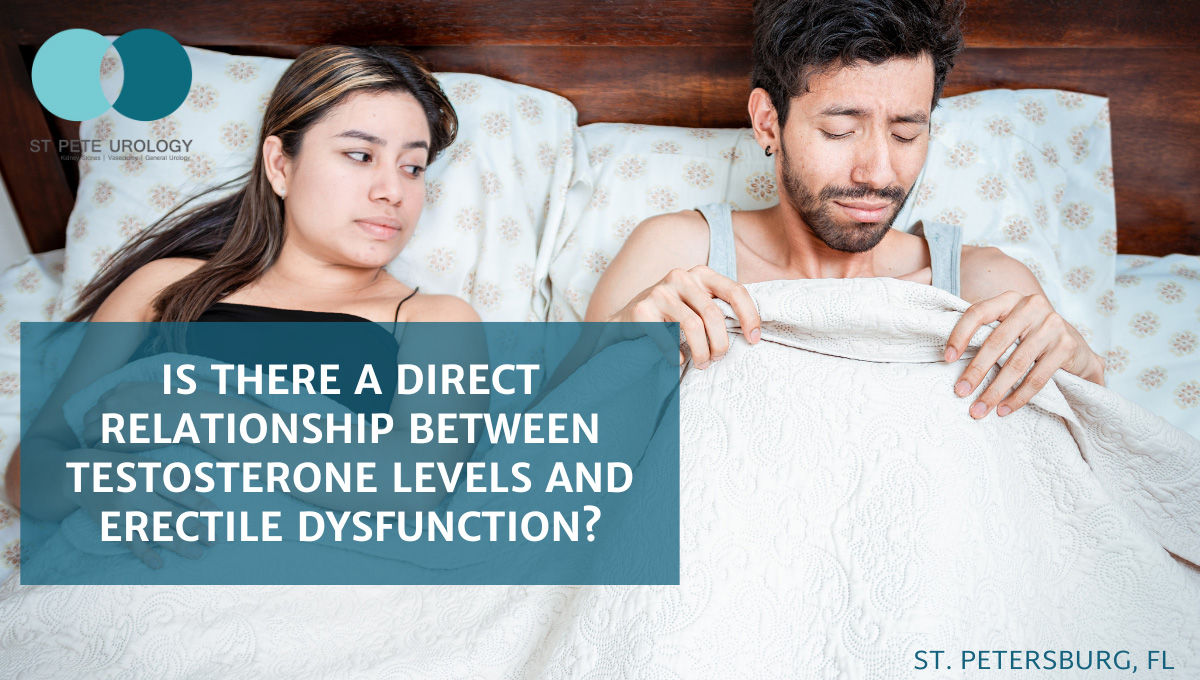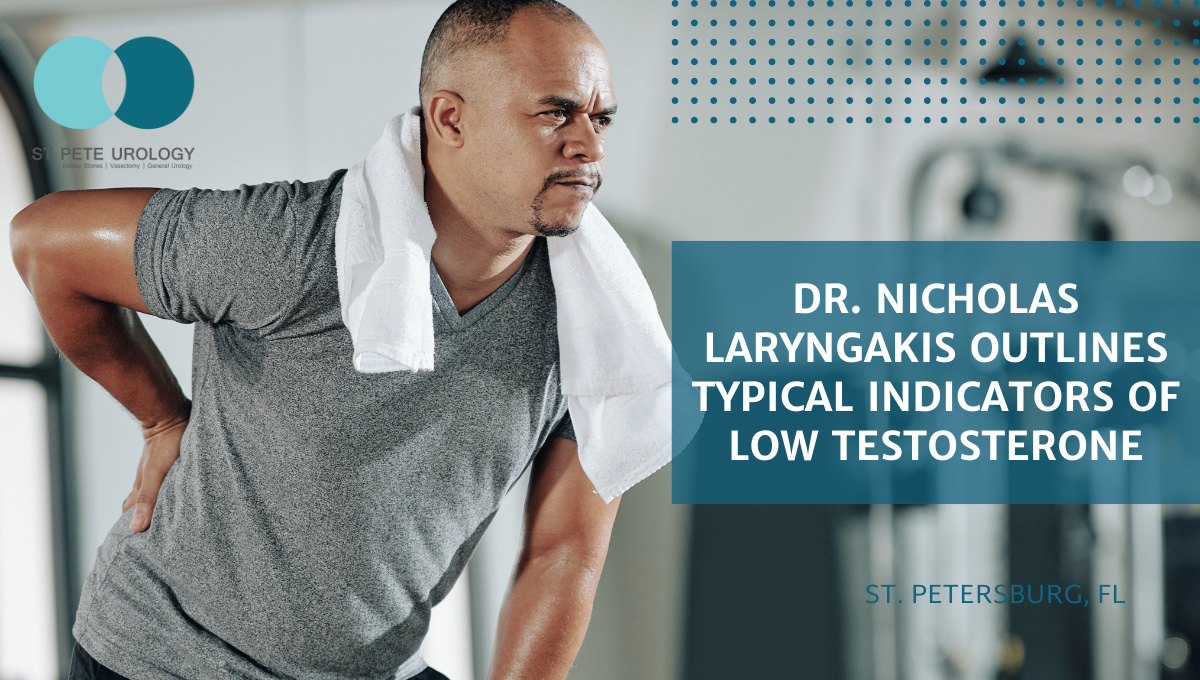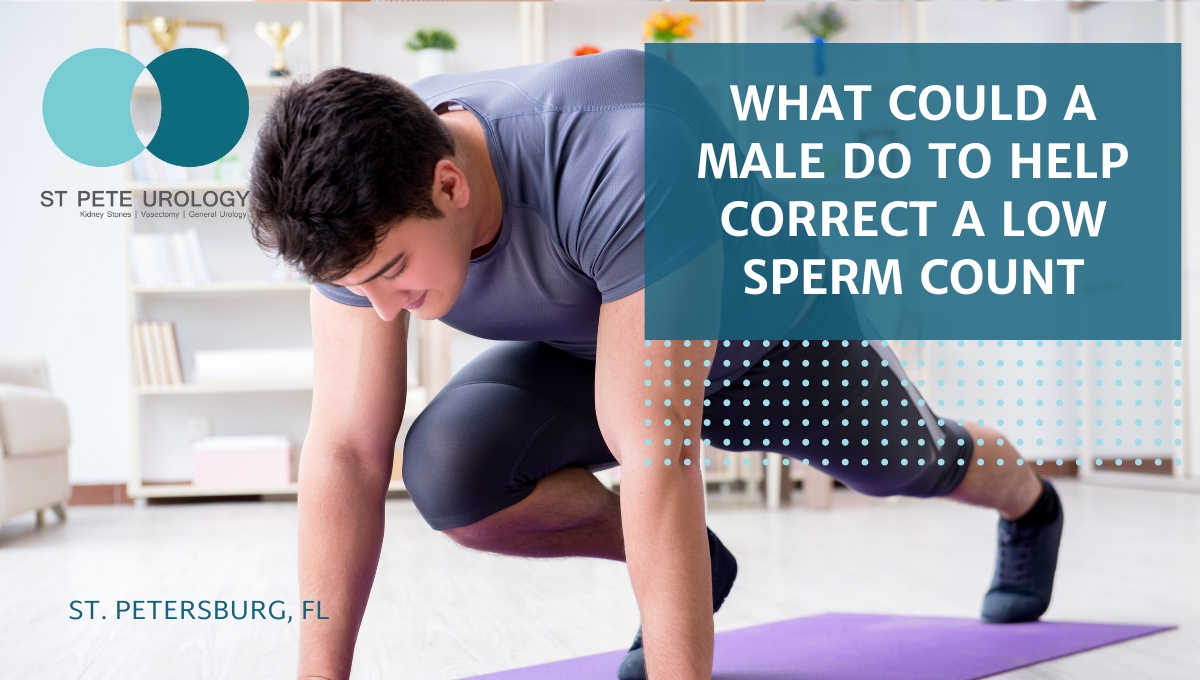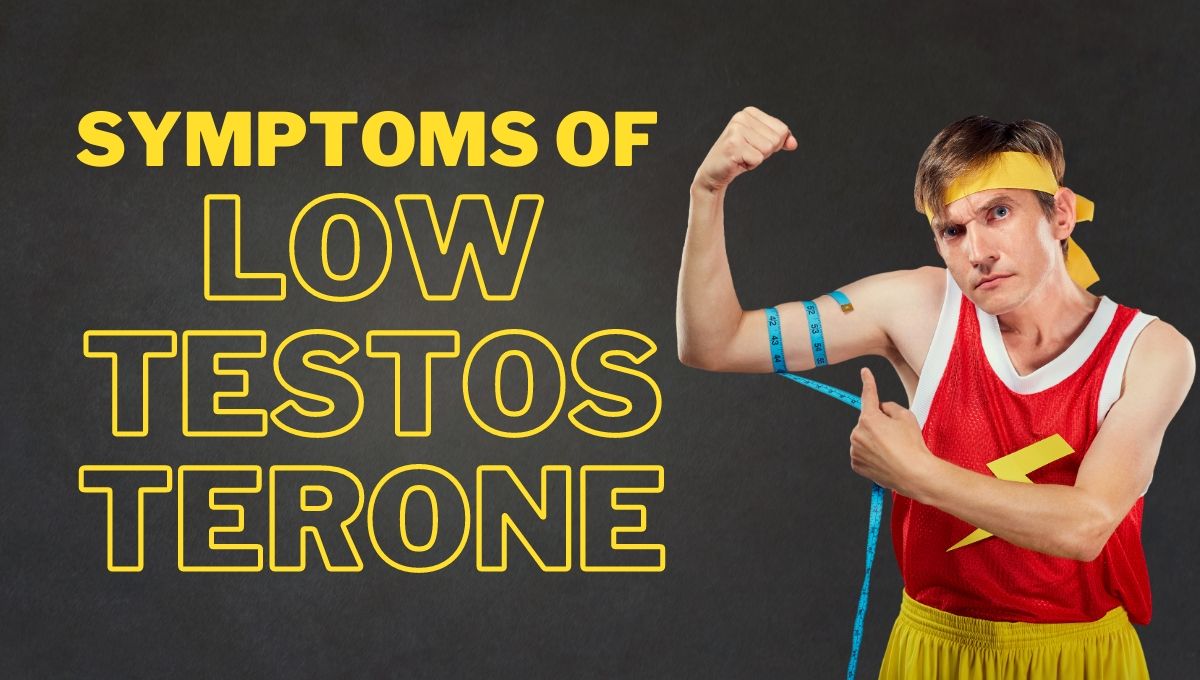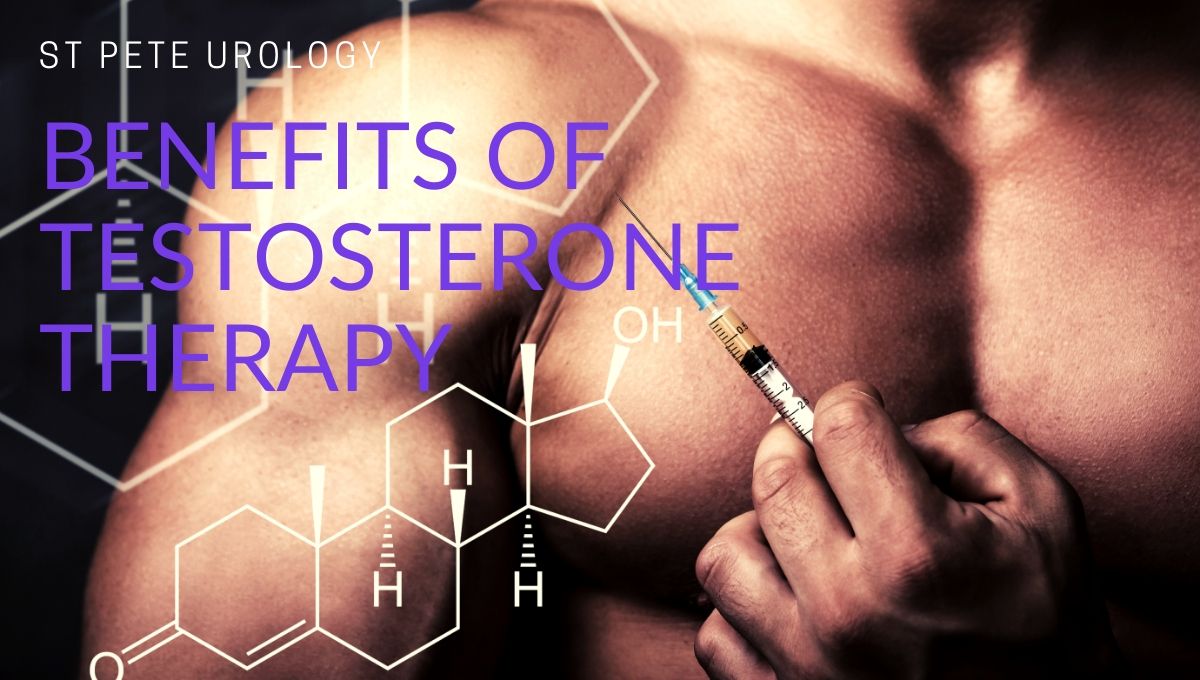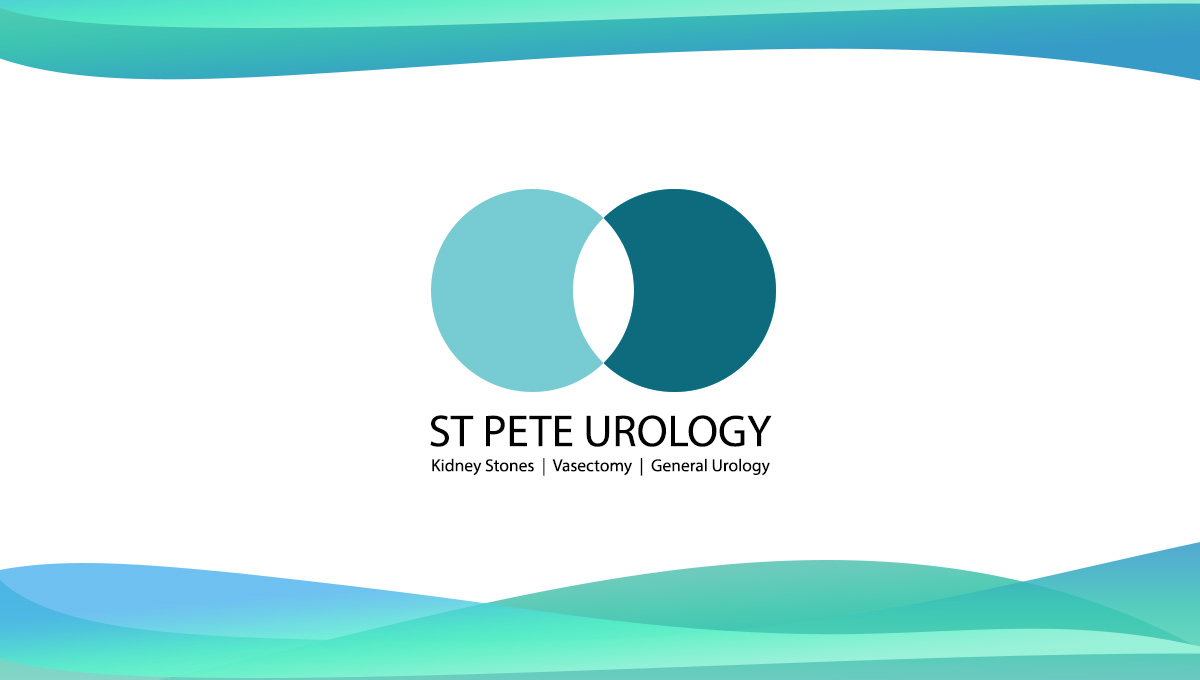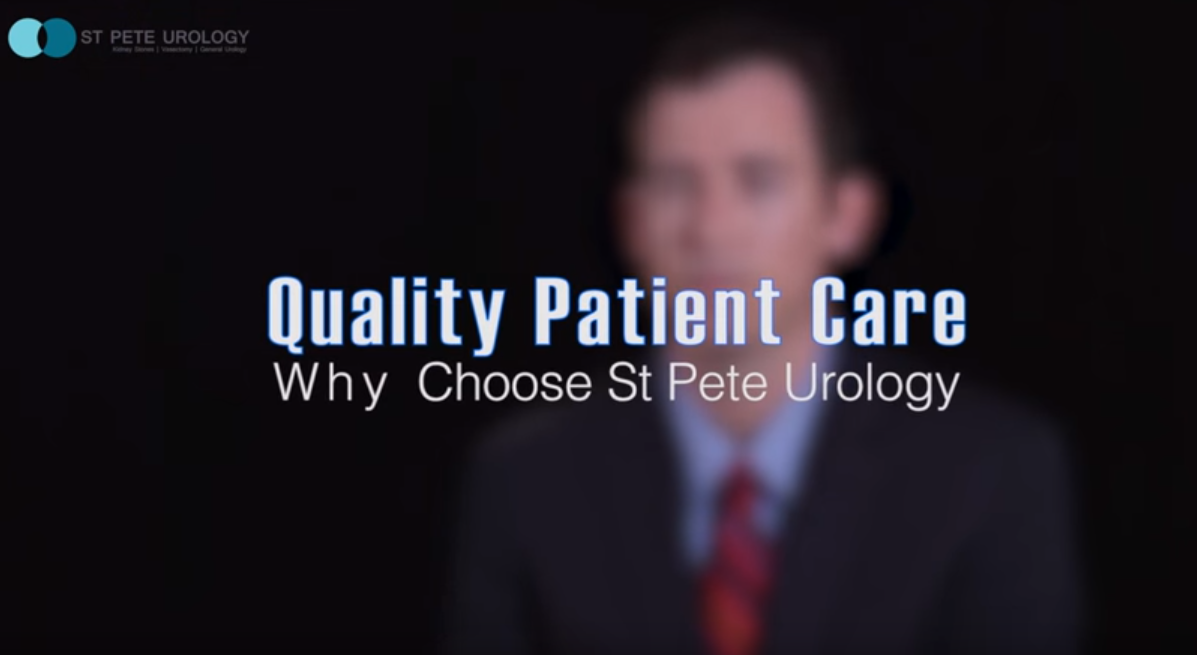Is there a direct relationship between testosterone levels and erectile dysfunction? There are a number of factors that can cause ED.
Continue readingDr. Nicholas Laryngakis Outlines Typical Indicators of Low Testosterone
Dr. Nicholas Laryngakis, urologist in St Petersburg, FL discusses the symptoms and indicators of low testosterone.
Continue readingWhat could a male do to help correct a low sperm count
Symptoms of Low Testosterone
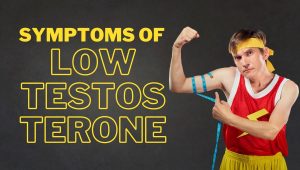

What is low testosterone?
When men have low testosterone levels, the condition is called “low-T” or hypogonadism. The bottom limit of normal testosterone in men is around 300 nanograms per deciliter (ng/dL) while the upper limit is about 900ng/dL depending on the lab. Low testosterone results in a lower-than-normal score from a blood test. Although testosterone production increases sharply during puberty, it usually decreases after age 30 at an estimated rate of 1% per year. This decrease results in low testosterone levels in about 4 out of 10 men above the age of 45, 2 out of 10 men over 60, 3 in 10 men over 70, and 3 in 10 men over 80 years of age. Nevertheless, the age at which testosterone deficiency first appears varies widely. Some men feeling great into their 70’s while a minority requires testosterone replacement therapy in their 20’s or even in their teens.
What are the symptoms of low testosterone?
- Diminished sexual function
Since testosterone is responsible for sex drive and high libido in men, a drop in hormone levels may result in a decreased desire for sex, a slightly lower sperm count, infertility, fewer and weaker spontaneous erections, increased refractory period after ejaculation and decreased sexual performance. Although erectile dysfunction (inability to achieve or maintain an erection) may not necessarily be caused by insufficient testosterone, if it accompanies low-T then hormone replacement therapy can help to treat the condition. The adverse effects of low-T should not occur suddenly. If they do, other underlying issues should be investigated and treated by a urologist or physician.
- Adverse physical changes
Since testosterone is responsible for increasing muscle mass, maintaining body and facial hair and contributing to the overall masculine form, a man with low testosterone will gradually experience physical changes. Such changes may include fragile bones, decreased strength and endurance, reduced muscle mass, increased fatigue, decreased body hair, hot flashes, tenderness or swelling in the breast tissue, frequent back pain, increased body fat, increased build-up of bad cholesterol, development of male breasts (gynecomastia) and increased risk of heart attack.
- Mental and emotional problems
Low-T can affect a man mentally and emotionally. For instance, a man with low testosterone may experience memory problems, difficulty concentrating (brain fog), sleep disturbances, frequent feelings of sadness and depression, irritability, mood swings, diminished self-confidence and reduced motivation. An accumulation of these mental and emotional challenges may degrade a man’s overall sense of well-being and adversely affect his quality of life.
Why should you see a urologist?
Men experiencing these symptoms should see a doctor for advice and treatment. The symptoms described above are not unique to low testosterone levels and could also be the normal side effects of aging or the effects of another serious condition such as thyroid malfunction, injury to testicles, testicular cancer, infection, HIV, type II diabetes, alcohol use, pituitary gland problems, genetic abnormalities affecting the testicles, or side effects of certain medications. By visiting a urologist, you will be examined, tested and treated for the correct condition causing the symptoms.
At St Pete Urology, we have skilled and experienced board-certified urologists who can give you proper advice on managing the symptoms of low-T. We will determine your testosterone level through a blood test and effectively treat the symptoms, allowing you to feel your best throughout your life. For more information on treatment of low-T, visit the St Pete Urology website.
Benefits of Testosterone Therapy
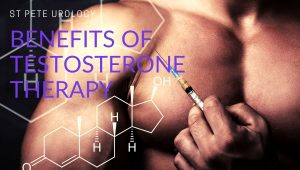

What is a normal testosterone level?
The normal levels of testosterone for men range from 300 to 900 nanograms per deciliter (ng/dL). When levels fall within this range, there is little to be gained from testosterone therapy. However, this range is only for total amount of testosterone and does not present the whole picture.
Urologists will also measure what is called free testosterone, the amount of testosterone that is active in a man’s body at a given time. A man with a normal range of total testosterone may still experience classic symptoms of low testosterone if his free testosterone level is low. Free testosterone level is the better indicator of whether treatment will be beneficial.
Benefits of testosterone therapy
Low free testosterone is a major factor in sex difficulties for men which is why testosterone replacement therapy can be an effective way to renew interest in sex and boost the ability to achieve and maintain an erection and orgasm. In addition, restoring normal testosterone through treatment has several benefits beyond sexual performance.
According to several medical studies, testosterone therapy can reduce the health problems related to diabetes, osteoporosis, metabolic syndrome and even obesity. Treating low testosterone helps to strengthen bones and prevent osteoporosis. There is also evidence that testosterone boosts blood sugar control and aids in preventing diabetes. Likewise, testosterone therapy can improve anemia and reduce the risk of cardiovascular disorders.
Testosterone also plays a critical role in how long a man lives. Studies have shown that there is a link between low free testosterone and shorter life expectancy in men. This link may be due to the role testosterone plays in reducing fat in the body while increasing muscle mass, indicating that the therapy is good for overall health.
Should you try testosterone replacement therapy?
If you are experiencing problems associated with low testosterone and considering this treatment, it is important to see your urologist or physician first to discuss whether the therapy will benefit you. A urologist will review your medical history, perform an examination and order tests for both total and free testosterone before suggesting a treatment that can dramatically improve your quality of life. For more information, visit the St Pete Urology website.
Treating Low Testosterone Properly
St Pete Urology in Florida offers a comprehensive and compassionate patient-centered approach to men with urological problems. We also listen and respond to the mental health problems related to the conditions we treat. Our experienced doctors know their work and efficiently diagnose and treat ailments with a focus on restoring and improving the overall health of the patients. For an all-inclusive, focused, safe and effective treatment of men’s issues, St Pete Urology leads the way.
How do we deal with men’s health and mental health problems?
At St Pete Urology we recognize that mental health problems can be closely interlinked with urological problems such as erectile dysfunction, low testosterone and enlarged prostate. We have tailored our screening, diagnostic and treatment procedures to also respond to the mental health needs of our patients. We take a leadership role in men’s health by treating a patient’s visit to our clinic as an opportunity to comprehensively assess his overall health.
For men suffering from the effects of low testosterone, we follow a biopsychosocial approach that goes beyond testosterone replacement therapy. For instance, we engage in distress screening and ask brief questions on relevant life domains such as work, substance use, relationship and sexual function to help us identify men with mental health problems. We also endeavor to build close and cordial relationships with our clients, which enable us to treat their urological problems while also acting as their gateway to mental care services through appropriate referrals.
Excellence in treating low testosterone
At St Pete Urology, we strive to ensure that your visit is as convenient as possible. We keep all the procedures for diagnosis and treatment of urologic disorders, from urologic consultation to testing and treatment, under the same roof. The availability of the latest diagnostic tools such as ultrasound, Ureteroscopy and cytoscopy, urodynamic studies, PSA, blood tests, urinalysis with culture, among others, makes us a reliable clinic for all types of urological issues. And because of our capacity to deliver accurate and timely results for testosterone tests, we offer a safe and more effective place to treat low testosterone.
What are the symptoms of low testosterone?
Also called Andropause or Hypogonadism, low serum testosterone is a condition affecting about 39 percent of all men who are 45 years old or older. Its prevalence increases with age and studies have shown that its incidence increases from roughly 20 percent in men older than 60 to 30 percent of men older than 70 and to 50 percent of men older than 80. When serum testosterone drops below the normal range, the following symptoms may occur:
- Diminished energy levels or fatigue.
- Reduced libido or a drop in sex drive.
- Sexual dysfunction characterized by weak erections or fewer erections.
- Increased body fat or weight gain.
- Reduced muscle mass.
- Decreased bone strength.
- Loss of body hair.
- Depressed mood.
- Hot flushes and sweats.
Low-T is diagnosed based on the symptoms and on blood tests measuring the amount of testosterone. This is why it is important to go to a clinic managed by a urologist and where low-T levels can be measured correctly.
At St Pete Urology, we are proud of our comprehensive and innovative diagnostic and treatment options for low testosterone. We follow a guideline approach to ensure that we have correctly identified patients with low-T and to guarantee that we do not miss a diagnosis. We also monitor our patients closely enough to be able to check for other related issues, including mental health problems. And when we find a patient whose testosterone is low, we order more tests to check for any underlying causes. So when you visit St Pete Urology, you can be sure that your diagnosis and treatment of low testosterone will be safe, effective and the best you can possibly get. For more information, visit the “St Pete Urology” site.
Low Testosterone Treatment: Potential Benefits and Risks
Testosterone hormone therapy comes in three different forms; intramuscular injection, patch, or gel form. The injection is usually administered once a week, the patch and gel are both placed on the skin as directed by the doctor [Read Full Article…]
Dr Reid Graves – Why Choose St Pete Urology
Dr Graves says that the St Pete Urology team of doctors and staff provide compassionate care to patients who often require difficult treatments in sensitive parts of their bodies. In most cases, patients are searching for answers to their medical questions, so the physicians strive to provide them with evidence-based solutions and treat them using the most advanced procedures. [Read Full Article…]
St Pete Urology Patient Care Options
St Pete Urology have successfully treated thousands of patients in the Tampa Bay Area with a focus on achieving the best possible results using the most advanced equipment and procedures. [Read Full Article…]
Erectile Dysfunction – Finding the Right Therapy for Each Patient
Erectile dysfunction (impotence) is a common problem that can limit your intimacy, affect your self-esteem and impact your most important relationships. It can also be a sign of another health condition that needs attention, such as poorly controlled diabetes or cardiovascular disease. [Read Full Article…]

